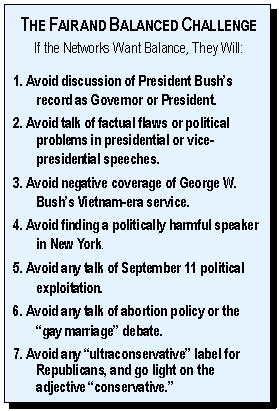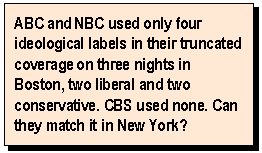 |
|||||||||
|
 |
||
|
 |
||||||||||||||||||||||||
|
||||||||||||||||||||||||
 |
||||||
|
||||||
 |
||||||
|
 |
||||||||||||||||||
|
||||||||||||||||||
 |
||||||||||||||||||||||||
|
||||||||||||||||||||||||
 |
||||||||||||||||||
|
||||||||||||||||||
|
|
|
For Immediate Release: Katie Wright (703) 683-5004 - Thursday, August 26, 2004

In Boston, Networks Avoided Labels, Social Issues, Anti-Kerry Vets, Quibbles on Facts or Policy Ideas
TV: Take the Fair and As much as network anchors like to protest that conventions are carefully crafted infomercials, the Boston convention last month often came to the Democrats packaged in gift wrap. The Democrats were presented as largely non-ideological, with no real divisions, with no exotic positions on social issues, with a convention that emphasized Kerry's manly military strength. Even their liberals were "liberal lions." As the networks prepare to cover the Republican convention in New York, the long history of liberal media bias and double standards is about to unfold on screen again. If the networks wish to present themselves seriously as a matched set of "fair and balanced" media outlets, they have a high bar of helpfulness to meet. Let's call it the Fair and Balanced Challenge. A thorough review by MRC news analysts of prime-time convention coverage on ABC, CBS, NBC, CNN, MSNBC, PBS - and for contrast, FNC - demonstrates that if fairness and balance are the goal, the networks will need great restraint. CONTROVERSIES
If the networks are going to treat the parties equally, there will be very little evaluation of factual flaws or political problems in the presidential and vice-presidential speeches. In past conventions, anchors have told viewers to tune into later newscasts for a review of Republican speech errors. In Boston, none of the major networks found any factual errors, and only CBS mentioned on Thursday that Republicans (and not the news media?) would ask of Kerry "where do you get the money to do some of the things he's going to do?" PBS found no problems. CNN and MSNBC each questioned Al Sharpton's suggestion that George W. Bush could be compared to segregationists. On MSNBC, Howard Fineman noted Kerry mentioned no spending cuts, and none were in the platform, and Republicans will say "your budget doesn't add up, your voting record doesn't add up." Andrea Mitchell also said "it simply doesn't add up." CNN's Judy Woodruff noted "he's got a health care plan that doesn't cover everyone at this point." If the networks are going to treat the parties equally, there will be little negative coverage of George W. Bush's Vietnam service. Despite the Boston convention's heavy emphasis on their nominee's "heroism" in the Vietnam era, critics of John Kerry's Vietnam war record or anti-war record were avoided by ABC, CBS, NBC, and PBS. MSNBC nibbled around the edges of Kerry criticism on three occasions, much less than they touted his war stories. On Thursday night, CNN discussed some of the charges of swift boat vets opposing Kerry in the 8:00 hour. FNC also discussed anti-Kerry veteran criticism of his Vietnam anti-war activities on Thursday.
If the networks are going to treat the parties equally, there will be no talk of September 11 political exploitation. Every network except MSNBC carried the Democrats' Monday 9/11 commemoration in full, and several lauded it. Peter Jennings saluted it as something "which everybody in the country would believe is almost essential to a political convention...to remember 9/11." On CNN, Wolf Blitzer called it a "moving moment," and said there will be similar moving moments at the GOP convention. If the networks are going to treat the parties equally, there will be almost no talk about abortion policy or the "gay marriage" debate. ABC, CBS, and NBC never mentioned abortion or gay issues in their three nights of coverage. CNN also avoided these issues in prime time. MSNBC avoided abortion talk, and carried two mentions of homosexuality. Chris Matthews asked Virginia Gov. Mark Warner how a pro-gay stand will play in the South. Only PBS noticed the absence of these issues, with two mentions of abortion and two of homosexuality. Reporter Gwen Ifill noted their absence. The abortion talk is separate from the modicum of talk about stem-cell research, with one exception. On PBS, Mark Shields noted that the Ron Reagan Jr. speech was introduced by "pro-life" Rep. Jim Langevin, showing some pro-life people who are not "ideologically orthodox." By contrast, FNC coverage mentioned abortion on eight occasions and gay issues on eight occasions. LABELING If the networks are going to treat the parties equally, they will never find a "far right" or "ultraconservative" person in New York, and not many "conservatives." No one found a "far left," "ultraliberal," or "radical" person in Boston. ABC, CBS, and NBC used only four ideological labels in their truncated coverage on three nights in Boston - two liberal and two conservative. ABC once called Ted Kennedy a "lion-like liberal." CBS didn't use a single ideological label. Can they match it in New York? NBC's three labels all came from Tim Russert touting the new tough-on-defense stand of Democrats. On Monday, he found it part of an "extraordinary night" that "liberal" Hillary Clinton wants more defense. He touted on Wednesday night that the Kerry-Edwards ticket was "almost running to the right of George W. Bush" on defense policy, and "trying, again, to almost move to the right of President Bush on defense and security issues." On the networks offering fuller coverage, there were a few more labels - 28 liberal labels and 12 moderate ones. CNN's regular anchors, reporters, and pundits offered nine liberal labels and two moderate ones. MSNBC on-air personalities used eight and four, and PBS staffers used eleven and six. More than half of the liberal labels (16) came on Tuesday, "Liberal Night," as PBS called it. Of these 28 liberal labels, seven described Sen. Ted Kennedy, and eight were applied to Kerry. Three of the five liberal Kerry labels on CNN were attributed (or "Republicans say") labels. On Wednesday night, John King noted "Republicans are saying" Kerry is "another liberal from Massachusetts." On the other hand, on PBS Thursday night, regular pundit David Brooks suggested "the party is to the left, the elite, and the Kerry-Edwards campaign is to the center, even the center-right." Of course, no two conventions can be covered exactly the same, since different parties may have different strengths and weaknesses, not to mention different news events that occur as conventions unfold. But the Big Picture biases of past conventions (on party unity, ideology, and negativity) suggest a great deal of spin that goes beyond the actual distinctions on the ground. Viewers should suspect that the occasion is too serious and the audience is too large for the networks to avoid their everyday temptation to favor one party and punish the other.
Home | News Division
| Bozell Columns | CyberAlerts |







 If the networks are going to treat the parties equally, there will be very little discussion of President Bush's record as Governor or President. Sound ridiculous? ABC, CBS, and NBC avoided John Kerry's legislative and voting record entirely, and failed to notice how Kerry avoided it. CNN and MSNBC touched on it once. But PBS spent several minutes on Thursday night exploring why Kerry was avoiding his record. FNC also noticed Kerry's biography seemed to avoid his Senate years. Fred Barnes said Kerry talked more about the flag than his Senate service.
If the networks are going to treat the parties equally, there will be very little discussion of President Bush's record as Governor or President. Sound ridiculous? ABC, CBS, and NBC avoided John Kerry's legislative and voting record entirely, and failed to notice how Kerry avoided it. CNN and MSNBC touched on it once. But PBS spent several minutes on Thursday night exploring why Kerry was avoiding his record. FNC also noticed Kerry's biography seemed to avoid his Senate years. Fred Barnes said Kerry talked more about the flag than his Senate service.  If the networks are going to treat the parties equally, ABC, CBS, NBC, and PBS will not locate a politically harmful speaker in New York. The most controversial speaker in Boston was leftist Al Sharpton, who wildly compared President Bush to a segregationist. ABC's Peter Jennings liked the speech so much he played a clip of it in prime time, saying the party was "energized...by a truly turned-on preacher." On PBS, Mark Shields said it was "remarkable." David Brooks added it was "fantastic." CNN noted it was "incendiary" and MSNBC's Chris Matthews tore into Sharpton's entire career and the Tawana Brawley hoax. On FNC, Alan Colmes said "it's about time" in lauding the speech. Sean Hannity said "he didn't like" the speech, but at least it deviated from the DNC script.
If the networks are going to treat the parties equally, ABC, CBS, NBC, and PBS will not locate a politically harmful speaker in New York. The most controversial speaker in Boston was leftist Al Sharpton, who wildly compared President Bush to a segregationist. ABC's Peter Jennings liked the speech so much he played a clip of it in prime time, saying the party was "energized...by a truly turned-on preacher." On PBS, Mark Shields said it was "remarkable." David Brooks added it was "fantastic." CNN noted it was "incendiary" and MSNBC's Chris Matthews tore into Sharpton's entire career and the Tawana Brawley hoax. On FNC, Alan Colmes said "it's about time" in lauding the speech. Sean Hannity said "he didn't like" the speech, but at least it deviated from the DNC script.